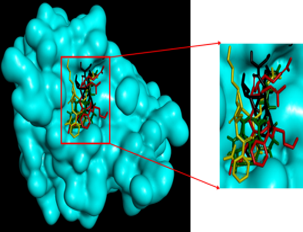Abstract
Dengue virus infection is one of the health problems in tropical and subtropical countries. Although this disease is common, unfortunately, until now no licensed vaccine or relevant drugs available in the market. The first objective of this study is to design potent and selective peptidic inhibitors by studying the interactions between the designed peptides and the dengue NS2B/NS3 protease using computational docking technique and secondly to compare the quantitative and qualitative docking results using two independent docking programs (MOE and AutoDock 4.2). The proposed peptides were designed based on literature reviews and previous findings on the interaction between dengue NS2B/NS3 protease and reported peptides, thus, we designed ten cyclic tetrapeptides and twenty cyclic pentapeptides. The results demonstrated that most of the proposed peptides were connected to the protease binding pocket and made interactions with the protease catalytic triad residues (His51, Asp75 and Ser135). Based on quantitative and qualitative docking results from the two docking programs, it showed that two cyclic tetrapeptides (1-C4 and 4-C4) and four cyclic pentapeptides (4-C5, 16-C5, 20-C5, and 6-C5) are the best potential inhibitors with the lowest free energy of binding and the high number of interactions with protease. In conclusion, the two independent docking programs could give almost the same results based on its quantitative and qualitative docking results. Thus, these potential peptides could serve as promising inhibitors for dengue virus. These findings will be further continued for the synthesis of these cyclic peptides and in vitro biological assays to confirm their activity.
Full text article
Authors

This work is licensed under a Creative Commons Attribution-NonCommercial-NoDerivatives 4.0 International License.

